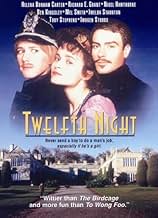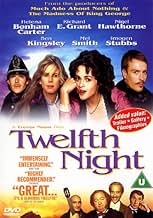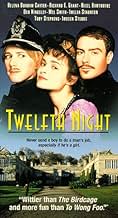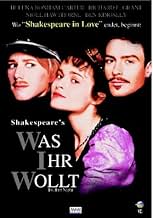Shakespeare's comedy of gender confusion, in which a girl disguises herself as a man to be near the count she adores, only to be pursued by the woman he loves.Shakespeare's comedy of gender confusion, in which a girl disguises herself as a man to be near the count she adores, only to be pursued by the woman he loves.Shakespeare's comedy of gender confusion, in which a girl disguises herself as a man to be near the count she adores, only to be pursued by the woman he loves.
- Director
- Writers
- Stars
- Awards
- 1 win & 2 nominations total
Sidney Livingstone
- Captain
- (as Sid Livingstone)
David Burke
- Party Guest
- (uncredited)
- …
- Director
- Writers
- All cast & crew
- Production, box office & more at IMDbPro
Featured reviews
In Illyria, Orsino (Toby Stephens), a nobleman, is saddened because he cannot have the love of Lady Olivia (Helena Bonham-Carter) who is mourning the loss of her brother. Meanwhile, twins Sebastian (Stephen Mackintosh) and Viola (Imogen Stubbs) both survive a terrible shipwreck off the coast, but each thinks the other has died. Viola takes the guise of a man and goes to work in the household of the nobleman, falling in love with Duke Orsino. Meanwhile Olivia is taken with Viola who calls herself Cesario. This is the premise of one of William Shakespeare's most appealing comedies, Twelfth Night: Or What You Will, updated from Elizabethan England to late 19th century and brought to life by director Trevor Nunn. It is one of the best interpretations of Shakespeare that I have seen on film.
Reminiscent of other Shakespearean cross-dressing comedies such as As You Like It, Twelfth Night is mostly about the ins and outs of romantic love but it is also about pride, "overweening ambition", disguises, and mistaken identities. The play contains some of Shakespeare's most memorable characters: Sir Toby Belch (Mel Smith), Olivia's drunken uncle, his friend Sir Andrew Aguecheek (Richard E. Grant) who is also trying to court Olivia, Olivia's gentlewoman Maria (Imelda Staunton), Feste (Ben Kingsley), the house clown, and Malvolio (Nigel Hawthorne) the prudish steward. Nunn has assembled a cast that more than does justice to the play. Imogen Stubbs as Viola actually looks like a handsome young man and has a sense of purity and innocence that makes her instantly likable. Helena Bonham Carter brings warmth to the character of Olivia who like Orsino seems to be in love with the idea of love not the reality. Some have noticed a similarity between the character of Olivia and Queen Elizabeth and interestingly, Olivia is addressed by Feste as "madonna", the only time the word is used in all of Shakespeare, perhaps a wry comment about the myth of the Virgin Queen.
The main story involves a love triangle between Orsinio, Viola, and Olivia but the minor characters have more than ample time on stage. Malvolio is both a comic and a tragic figure, said to caricature Sir Christopher Hatton, a courtier, romantic pursuer of the Queen and rival of the Earl of Oxford. Hatton was so fawning Elizabeth called him her "sheep" or "mutton" and this allusion is present early in the play as Malvolio is called a "rascally sheep-biter", harking back to Hatton's letter assuring Elizabeth that "The sheep hath no tooth to bite while the Boar's (Oxford) tusk doth raze and tear." Malvolio is a puritan who rails against people having fun, a trait that earns him the enmity of Sir Toby and Maria. To strike back, Maria engineers a joke on Malvolio. She forges a love letter supposedly from Olivia telling him that if he wants her to notice him, he should dress in yellow stockings and crossed garters and, as he woos Olivia dressed in his strange attire, Malvolio cuts a ridiculous figure (incidentally this is the same costume worn by Henry VIII when he danced with Anne Boleyn, Queen Elizabeth's mother, at a masked ball, before he had her beheaded for adultery).
While there are many great performances, the star for me is Ben Kingsley who is totally convincing as Feste, a fool but a knowing one who functions as an objective commentator of the scene around him, exuding an air of righteous superiority. His portrayal of the priest Sir Topas who interrogates Malvolio in a darkened room has overtones of the 1581 trial and execution of Edmund Campion, a Jesuit priest who was executed by the English government in 1581. In his speech of less than fifty words, which appears to resemble nothing but nonsense, there are no less than five phrases which refer directly to Edmund Campion and his 1580-81 mission to England.
Richard Desper has pointed out that the mock trial scene works as a parody of the government persecution of Catholic martyrs. "The playwright," he writes, "demonstrates for us a world turned upside down, with clowns passing themselves off as men of learning, while men of learning are pressed to deny what they believe to be true to serve political ends." The ending is too delightful to give anything away but it reminded me of the Ingmar Bergman comedy Smiles of a Summer Night, where mismatched couples get together at a summer cottage to sort everything out. Malvolio is pitiable in trying to redeem a shred of dignity but we feel for him when he exits saying, "I shall be revenged on the whole pack of you". As he leaves, he is the only person suffering in a sea of happy faces, those on screen as well as those at home.
Reminiscent of other Shakespearean cross-dressing comedies such as As You Like It, Twelfth Night is mostly about the ins and outs of romantic love but it is also about pride, "overweening ambition", disguises, and mistaken identities. The play contains some of Shakespeare's most memorable characters: Sir Toby Belch (Mel Smith), Olivia's drunken uncle, his friend Sir Andrew Aguecheek (Richard E. Grant) who is also trying to court Olivia, Olivia's gentlewoman Maria (Imelda Staunton), Feste (Ben Kingsley), the house clown, and Malvolio (Nigel Hawthorne) the prudish steward. Nunn has assembled a cast that more than does justice to the play. Imogen Stubbs as Viola actually looks like a handsome young man and has a sense of purity and innocence that makes her instantly likable. Helena Bonham Carter brings warmth to the character of Olivia who like Orsino seems to be in love with the idea of love not the reality. Some have noticed a similarity between the character of Olivia and Queen Elizabeth and interestingly, Olivia is addressed by Feste as "madonna", the only time the word is used in all of Shakespeare, perhaps a wry comment about the myth of the Virgin Queen.
The main story involves a love triangle between Orsinio, Viola, and Olivia but the minor characters have more than ample time on stage. Malvolio is both a comic and a tragic figure, said to caricature Sir Christopher Hatton, a courtier, romantic pursuer of the Queen and rival of the Earl of Oxford. Hatton was so fawning Elizabeth called him her "sheep" or "mutton" and this allusion is present early in the play as Malvolio is called a "rascally sheep-biter", harking back to Hatton's letter assuring Elizabeth that "The sheep hath no tooth to bite while the Boar's (Oxford) tusk doth raze and tear." Malvolio is a puritan who rails against people having fun, a trait that earns him the enmity of Sir Toby and Maria. To strike back, Maria engineers a joke on Malvolio. She forges a love letter supposedly from Olivia telling him that if he wants her to notice him, he should dress in yellow stockings and crossed garters and, as he woos Olivia dressed in his strange attire, Malvolio cuts a ridiculous figure (incidentally this is the same costume worn by Henry VIII when he danced with Anne Boleyn, Queen Elizabeth's mother, at a masked ball, before he had her beheaded for adultery).
While there are many great performances, the star for me is Ben Kingsley who is totally convincing as Feste, a fool but a knowing one who functions as an objective commentator of the scene around him, exuding an air of righteous superiority. His portrayal of the priest Sir Topas who interrogates Malvolio in a darkened room has overtones of the 1581 trial and execution of Edmund Campion, a Jesuit priest who was executed by the English government in 1581. In his speech of less than fifty words, which appears to resemble nothing but nonsense, there are no less than five phrases which refer directly to Edmund Campion and his 1580-81 mission to England.
Richard Desper has pointed out that the mock trial scene works as a parody of the government persecution of Catholic martyrs. "The playwright," he writes, "demonstrates for us a world turned upside down, with clowns passing themselves off as men of learning, while men of learning are pressed to deny what they believe to be true to serve political ends." The ending is too delightful to give anything away but it reminded me of the Ingmar Bergman comedy Smiles of a Summer Night, where mismatched couples get together at a summer cottage to sort everything out. Malvolio is pitiable in trying to redeem a shred of dignity but we feel for him when he exits saying, "I shall be revenged on the whole pack of you". As he leaves, he is the only person suffering in a sea of happy faces, those on screen as well as those at home.
Trevor Nunn's beautifully photographed and acted, deftly written film is one of the most enjoyable adaptations of a Shakespeare play ever made. Helena Bonham Carter is pitch perfect as the beautiful Olivia, who in "deep mourning" for her dead brother, falls in love with Cesario (who happens to be a woman named Viola dressed up as a man, wonderfully played by Imogen Stubbs, the only actress I've ever seen able to create both a charming Viola and a totally believable Cesario), meanwhile Viola falls for the Duke of fictional Illyria (the exquisite Toby Stephens) who is desperately in love with the Lady Olivia. Meanwhile, Viola's lost twin brother (Steven Mackintosh of "Gentlemen Don't Eat Poets", excellent again here) winds up in Illyria and adds to the confusion. Wonderful, layered support comes from Ben Kingsley playing Feste, Olivia's fool. The only flaw, perhaps, is the few minutes before the conclusion when everything seems to be coated with a thick gloss of sugar; the film comes through this unscathed. Trevor Nunn comes through with an exquisite Shakespeare film adaptation (which is a do or die task). A great showcase for the heavenly cast featuring some of the best performances ever by Bonham Carter (save "Wings of the Dove"), Kingsley (in his best supporting turn ever), novice Stubbs, and Stephens. A very worthwhile effort. Rent it, you won't be let down.
As with most Shakespearian comedies, the plot is deeply implausible. However, the excellent Cornish locations at St Michael's Mount & Lanhyrock give a good sense of place and the winter setting (apart from the scene of apple picking!) comes across well - it really does look like an English winter, rather than a picture postcard snow-scene.
The play is cut down to a manageable length without losing the sense of it, The broad comedy aspects (Toby Belch et al) are thankfully limited.
The acting is well done by a cast of British stalwarts. Amazingly, Viola and Sebastian actually do look broadly alike.
This film is best viewed as an amusing light romantic comedy rather than a side-splitter.
The play is cut down to a manageable length without losing the sense of it, The broad comedy aspects (Toby Belch et al) are thankfully limited.
The acting is well done by a cast of British stalwarts. Amazingly, Viola and Sebastian actually do look broadly alike.
This film is best viewed as an amusing light romantic comedy rather than a side-splitter.
This is, quite simply, the best production of a Shakespeare comedy ever filmed. The plot is delightfully absurd, the acting brilliant, the direction superb. It is the sort of comedy you can watch over and over again.
Reading Trevor Nunn's thoughts on his film, it is easy to conclude that they were lucky to obtain such sublime weather for the large duration of the filming, in November. The Cornwall locations are absolutely enchanting; showing an England so far from the urban norm these days. The beautiful natural light, with later dark contrasts, perfectly complements the jovial, winning mood of this Shakespeare comedy brought to screen: and, what is more, this is truly beyond any sense of 'heritage cinema', as Shakespeare's genius is retained.
Yes, it is all a very 'accessible' package, but much is unusual and distinctive to this film adaptation. Ben Kinglsey is perhaps the most glaring instance of a radical re-invisioning; his acting - stripped bare of artifice - is utterly compelling and keeps you watching his every mannerism. This Feste is an eccentric, multi-talented clown and performer, but he also bears words of cutting, melancholy truth. Indeed, both are wonderfully combined with the gorgeously sad scene of Staunton, Grant and Smith listening to his sad song: they listen and the words cut into their veneers. Loneliness is at their very core. What a brilliantly rounded comedy this is; balanced by melancholy - the inch-perfect awry note struck by Hawthorne's Malvolio appearing at the end - and good will - the comradely bonhomie that Grant and Smith are indeed shown to share.
Hawthorne and perhaps more surprisingly Mel Smith and Richard E. Grant really do a fine job and imbuing some real character in their parts; treading a line between broad comedic playing and human sadness. Along with Kingsley's career-best (? not seen too many of his films) performance, they lend this film its heart, and play very well against the wonderful settings. Mackintosh and Stubbs are I guess a little less compelling, but these roles are really difficult to carry off... nothing about them really lingers too long in the memory, like Kingsley's expressions, bizarre little pieces of dance and his pared-down delivery. Helena Bonham Carter is perhaps overly assured as the vain countess dame, Olivia: oh so archly bemused when faced by the cross-gartered, prancing Hawthorne, but generally Ms. Bonham Carter is very much in her usual, predictably petulant, period-costume mode. Which is probably being unfair; she does convince, at the end of the day.
Overall then, a wonderfully colourful delight, bearing the flavour of bright, melancholy late summer-into-autumn. A strange chill is cast by the compelling Kinglsey; a sadness that cannot be dispelled. This film has light amusement in addition to this real edge, and is ultimately a very affecting rendering of a bona fide Shakesperean classic.
Yes, it is all a very 'accessible' package, but much is unusual and distinctive to this film adaptation. Ben Kinglsey is perhaps the most glaring instance of a radical re-invisioning; his acting - stripped bare of artifice - is utterly compelling and keeps you watching his every mannerism. This Feste is an eccentric, multi-talented clown and performer, but he also bears words of cutting, melancholy truth. Indeed, both are wonderfully combined with the gorgeously sad scene of Staunton, Grant and Smith listening to his sad song: they listen and the words cut into their veneers. Loneliness is at their very core. What a brilliantly rounded comedy this is; balanced by melancholy - the inch-perfect awry note struck by Hawthorne's Malvolio appearing at the end - and good will - the comradely bonhomie that Grant and Smith are indeed shown to share.
Hawthorne and perhaps more surprisingly Mel Smith and Richard E. Grant really do a fine job and imbuing some real character in their parts; treading a line between broad comedic playing and human sadness. Along with Kingsley's career-best (? not seen too many of his films) performance, they lend this film its heart, and play very well against the wonderful settings. Mackintosh and Stubbs are I guess a little less compelling, but these roles are really difficult to carry off... nothing about them really lingers too long in the memory, like Kingsley's expressions, bizarre little pieces of dance and his pared-down delivery. Helena Bonham Carter is perhaps overly assured as the vain countess dame, Olivia: oh so archly bemused when faced by the cross-gartered, prancing Hawthorne, but generally Ms. Bonham Carter is very much in her usual, predictably petulant, period-costume mode. Which is probably being unfair; she does convince, at the end of the day.
Overall then, a wonderfully colourful delight, bearing the flavour of bright, melancholy late summer-into-autumn. A strange chill is cast by the compelling Kinglsey; a sadness that cannot be dispelled. This film has light amusement in addition to this real edge, and is ultimately a very affecting rendering of a bona fide Shakesperean classic.
Did you know
- TriviaIn the mid 1950s, director Joseph L. Mankiewicz tried to set up a version with Audrey Hepburn and Danny Kaye, but it failed to materialize.
- GoofsDuring one of the final scenes, when Malvolio reenters, it can be seen that his left shoe is missing. However, as he is walking up the stairs, you can clearly hear both heels clicking on the steps.
- How long is Twelfth Night?Powered by Alexa
Details
- Release date
- Countries of origin
- Official site
- Language
- Also known as
- Twelfth Night
- Filming locations
- Lanhydrock House, Bodmin, Cornwall, England, UK(Olivia's house and garden)
- Production companies
- See more company credits at IMDbPro
Box office
- Budget
- $5,000,000 (estimated)
- Gross US & Canada
- $588,621
- Opening weekend US & Canada
- $33,451
- Oct 27, 1996
- Gross worldwide
- $588,621
Contribute to this page
Suggest an edit or add missing content







































